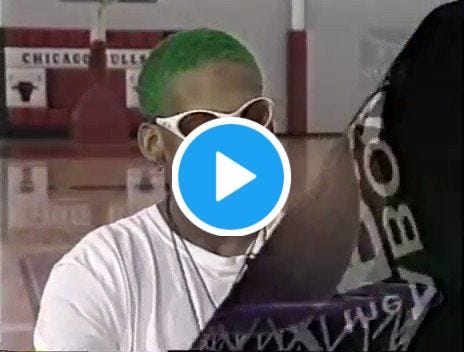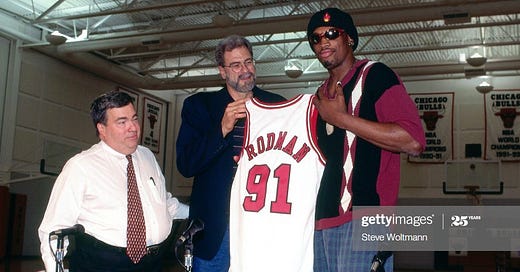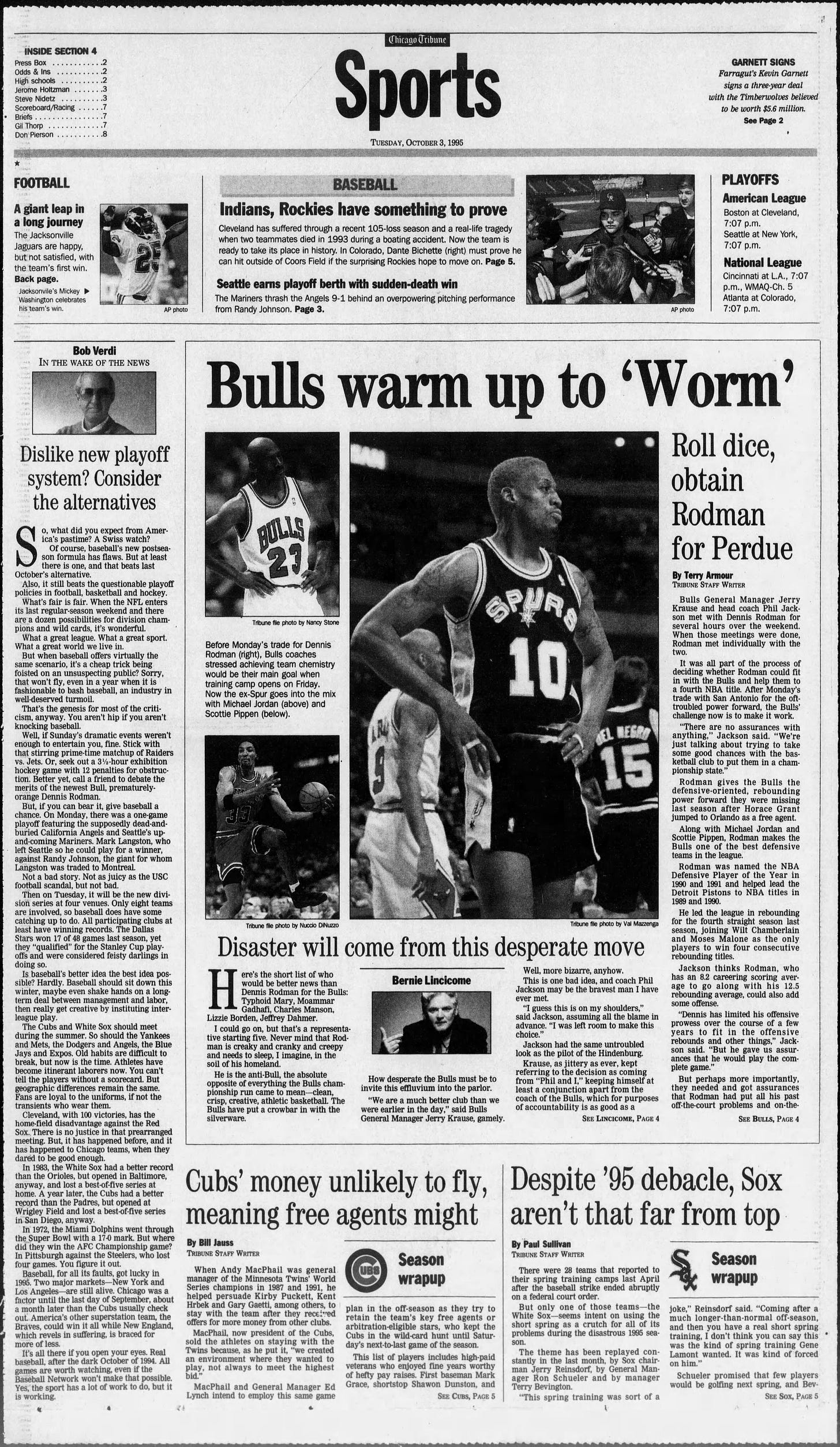Phil Jackson and Jerry Krause were a great duo. Dennis Rodman is the proof.
Despite their differences and later feud, Jackson and Krause helped Rodman win.
(Getty Images, Steve Woltmann)
“Phil and I thought very carefully about this.”
“I guess this is on my shoulders. I was left room to make this choice.”
Jerry Krause, and Phil Jackson, Oct. 2, 1995, on working together to acquire Dennis Rodman
Jerry Krause and Phil Jackson were made for each other.
Krause fancied himself a scout’s scout and eyed Jackson from his earliest days of stardom, first as a gangly forward at the University of North Dakota, and then a sparkplug off the bench for the champion New York Knicks.
Krause and Jerry Reinsdorf shared a love of Jackson’s coach with the Knicks, Red Holzman, and Krause interviewed Jackson for a Bulls assistant coaching position for the ‘85-’86 season, the year before he hired him for Doug Collins’ staff.
But the moment that Jackson became destined for a career with the Bulls came toward the start of Krause’s time in Chicago, during the 1985 season, when he contacted Phil Jackson, head coach of the CBA’s Albany Patroons, to scout the CBA.
“He sent me detailed reports, well written, really comprehensive, and I thought, O.K., let’s just store this away in the back of my mind,” Krause told the New York Times in 2011.
As The Last Dance wages on, viewers will drop deeper and deeper into the various feuds that demolished a dynasty, and none comes with more questions or higher stakes than the catastrophic combination of Jerry Krause and Phil Jackson.
Krause took a ton of heat between 1997 and 1999 for the breakup of the Bulls. More than 20 years later, and three years after his death, he remains the dynasty’s most popular villain, a notion the documentary reinforces after two episodes and one I agree with, albeit to a point.
To the degree to which the Krause-Jackson feud destroyed the championship Bulls, Krause holds a fair share of responsibility, especially considering this week’s revelations from Tim Floyd that Krause began his pursuit of Floyd as Bulls head coach in March 1989, which was before Krause had even fired Doug Collins as head coach, much less hired or fired Phil for that position.
“Jerry walked up to me and said, ‘You don't know me but I want to let you know you're going to be our next head coach,’” Floyd said last week about Krause’s first conversation with him. “Jerry always had a coach in his pocket. I’m sure if he hired me he was going to have a coach in his pocket that he was going to hire.”
Phil is likely responsible for their feud, too, in at least way not yet addressed by The Last Dance, and one that I will be digging into in the coming weeks. And of course as the man in charge, Jerry Reinsdorf holds his share of responsibility for everything with the dynasty both good and bad.
The shame of this is that no matter who was at fault for the feud between Krause and Jackson, their working relationship was, well, working.
And no proof is stronger than the story of how Dennis Rodman came to Chicago — and thrived once he got here.
The Sleuth and The Zen Master turn The Worm
The Bulls’ acquisition of Dennis Rodman in October 1995 in a straight-up trade for Will Perdue — and Rodman’s three-year success with the team — is the perfect example of how Jerry Krause and Phil Jackson could use their most dominant traits in concert for outcomes not possible without the other. For Krause, those traits included intense loyalty and the desire to find “gems.” Jackson’s key traits were the ability to understand outcasts and to craft a team hierarchy that supports each individual.
A shared Krause-Jackson trait that helped connect with Rodman: a no-frills, even grating approach to straight talk.
Entering the 1995 offseason, the Bulls had one major flaw: size. In their playoff loss that spring, the Bulls faced size disadvantages against the victorious Orlando Magic in the backcourt and on the boards, with B.J. Armstrong unable to counter Orlando’s big guards and Toni Kukoc ineffective in matching ex-Bull Horace Grant.
To solve the guard problem, the Bulls surprised many by leaving the recent All-Star Armstrong unprotected in the 1995 expansion draft. (Here is my explanation of that decision.)
B.J.’s departure opened a salary slot of $2.4 million that could be used for a power forward, and the team got right to work, with a list of about 10 names, led by Derrick Coleman (Phil’s preference) and Jayson Williams (MJ’s preference), both of the Nets.
The tricky name on the list was Dennis Rodman. The upside: He was the four-time reigning rebounding champ, a two-time former Defensive Player of the Year, a two-time champion and was coming off a season in which he was third team All-NBA and first team All-Defense.
The downside: He had a brutal history with Jordan and Pippen from his days with the Bad Boys, and struggled to stay on the court in 1995 for many reasons of his own making, missing the first 18 games of the season due to two suspensions and a leave of absence, missing 14 games in March and April due to a motorcycle injury and missing a playoff game due to another team suspension.
“Coach (Bob Hill) has to tame Dennis Rodman, but there’s nothing to tame — you just let him go play ball,” Rodman said during the Western Conference Finals, which the Spurs eventually lost to the Rockets.
While Krause viewed Rodman as decidedly not “OKP” — Krause’s pet term for a culture fit: “Our Kind of Person” — his longtime assistant Jim Stack felt otherwise. Stack spent the Bad Boys era as the Bulls’ advance scout, responsible for scouting upcoming playoff opponents.
“What was compelling about Dennis is after he would play 45 minutes in a game, he would go in the weight room for an hour-and-a-half,” Stack told the Daily Herald in 2011. “I’d see Dennis in there and he’s working himself into a lather riding the exercise bike, lifting weights. That always stuck with me.”
As Stack added this week in another Daily Herald interview:
“The guy never gets tired. He was a freak like Michael in that respect,” Stack said. “He was bionic.”
Stack worked on Krause throughout the summer, and Krause did his due diligence, calling around the league to people who knew Rodman. Most of these calls backfired, making Krause less inclined to pursue a deal. But Stack continued pushing, and Krause’s trust of Stack ultimately brought the GM to the table, as did, I believe, Krause’s love of being “The Sleuth” and his desire to uncover gems. There was no better diamond in the rough than Rodman, a supremely talented player who had terrified his employer.
Meanwhile, Phil was making his own calls, including a promising one with Rodman’s Detroit coach Chuck Daly, which left Phil “real encouraged,” he said after the trade was completed. There were talks with Jordan and Pippen, too, and at long last came a series of meetings with Rodman at the Berto Center and at Krause’s house in Highland Park, with a group of key Bulls stakeholders in attendance at Krause’s house, MJ and Scottie included.


This was where the straight talk of both Jackson and Krause came to play. First there was Jackson, addressing Dennis’s physical presence, not by admonishing him for his hair color or earrings, but by focusing on his professionalism and humanity.
“Stand up, Dennis,” Jackson said to Rodman, who was seated on Krause’s couch, wearing sunglasses and a hat. “You need to stand up to shake my hand.”
Rodman stood and shook Jackson’s hand. Phil kept at it.
“Now Dennis,” Jackson inquired, “could you please take your sunglasses off so I can see you?” Rodman obliged.
While Jackson’s straight talk was direct yet calm, Krause’s was blunt and coarse. Krause explained his discussions to author Roland Lazenby during interviews for Lazenby’s 1998 book Blood on the Horns: The Long Strange Ride of Michael Jordan’s Chicago Bulls.
“I asked him, ‘Dennis, why didn’t you get along with Billy McKinney? Why didn’t you get along with Bob Bass?’” Krause recalled, referring to the then-GMs of the Pistons and Spurs. “He looked at me and said, ‘They all want to be my friends.’
“I said, ‘I don’t want to be your friend. I’m 56, you’re 34. What the fuck do I need to be your friend for? You’re sitting here with green hair and you got earrings up your ass. We have nothing in common. I’ll leave you alone.’”
Jackson was equally blunt. As Rodman recalled:
“The first thing I want you to do is go over there and apologize to Scottie Pippen,” Jackson said. So Rodman and Pippen separated themselves from the group, where Rodman apologized for his past beatings of Pippen, and any other air that needed clearing.
“It’s okay, everything is fine man. Don’t worry about it,” Rodman recalled Pippen saying.
Rodman went back into Krause’s house, where Jackson had one question for him.
“Dennis, would you like to be a Chicago Bull?”
“I don’t give a damn if I’m here or not,” Rodman said.
“Congratulations,” Rodman recalled Jackson saying. “You’re a Chicago Bull.”
Krause’s final assessment upon the announcement of the acquisition:
“We are a much better ball club than we were earlier in the day.”
How Phil coached Dennis: embrace the heyoka
While I’ve seen no one state it explicitly, I think the reason Krause leaned so heavily on Phil regarding Dennis’s acquisition — and why Krause trusted it would work — is that no combination of head coach and star were so well suited to handle the mercurial, gifted and often tardy Rodman. Phil Jackson in particular seemed built for this particular personality challenge.
“Dennis’ antics are not as important as his heyoka component,” Jackson told the Tribune’s Bernie Lincicome during the 1996 NBA Finals in an attempt to explain his muted reactions to Rodman. He was referring to a mythical figure for the Lakota people known as “the sacred clown.” Jackson explained it as “A backwards-walker, a cross-dresser,” adding, “Dennis loves these comparisons.”
“Somewhere around the middle of training camp (in 1995-96), I realized I was having a lot of fun coaching this team,” Jackson said in 2019. “And Dennis Rodman brings a lot of levity to the game. I get a kick out of watching him play. … There are things about his individuality that remind me of myself.”
Rodman fed off of that acceptance. Jackson understood that, both from his discussions with Daly, his dealings with Rodman plus his own intuition. Upon Rodman’s arrival, Jackson set the expectation for the team, explaining that while Rodman would be treated fairly, “fairly” did not mean “the same.”
Rodman would be late to practice, Jackson told them. The team would neither excuse it nor hammer him for it. They would address it through fines and move on.
Contrast that with how the Spurs treated Rodman, including the team suspending him indefinitely at the start of just his second season with the team.
“We’re just trying to get his attention as best we can,” Spurs coach Bob Hill said about Rodman’s suspension. “We’ve pretty much planted our feet on the kind of team we want to have. He needs to become a part of that.”
Rodman thought that Bob Hill, David Robinson and the rest of the Spurs organization focused on the wrong things about him. They were rigid, but not necessarily about winning — merely about behavior, independent of results. The Bulls focused only on results, as seen when a reporter asked Jordan after the 5th championship if he wanted the free agent Rodman back for the ‘97-’98 season.
“Sure. His dresses doesn’t bother me, his hair doesn’t bother me,” Jordan said. “Sure, he’s going to go wacko every now and then. We’ve come to live with that. We’ve come to accept that. But you can’t find another player on the basketball court that works just as hard as Dennis Rodman, gives 110%, dives at loose balls, even if he can’t get them. That’s Dennis Rodman. So I don’t have a problem with Dennis. And I don’t think Phil does and I don’t think … Scottie does. We’ve been able to control him to some degree. And look, we’re here: champions back-to-back.”
Those opening lines elicited laughter from the reporters, but the totality of MJ’s response revealed the ways in which Jordan, as well as Jackson and Pippen, remained focused on outcomes — championships — and did not allow for every single bit of Rodman’s eccentric behavior become a distraction or controversy. While the Spurs would battle Rodman in the press and suspend him, Phil Jackson led a hands-off approach that mostly kept Rodman on the court.
Even when Rodman was at his worst — such as headbutting referee Ted Bernhardt in 1996 — Jackson reacted with fawning disbelief and his trademark wry smile.
“Phil handles him real well,” Steve Kerr said after Rodman’s headbutting incident, one of his two most infamous on-court moments as a Bull. “Things don’t get magnified. Phil gives leeway to people without losing his authority, which is the secret to his success.”
Several times in his Bulls career, Dennis Rodman came right to the edge of self-destruction. Yet when MJ hit the last shot to wrap the dynasty, Rodman was among the five men on the court. His success is a testament not just to his own talents, and the captainship of MJ and Scottie, but to the team structure Phil Jackson built and the players Jerry Krause provided.
When they weren’t busy snubbing each other in wedding invitations and Christmas gifts, Jackson and Krause were an ideal duo. The scout’s scout and the coach’s coach. Krause is, I think, vastly more responsible for the deconstruction of their partnership, especially considering the new information from Tim Floyd. Krause seemed hellbent on escaping Jackson’s shadow, and Jordan’s, and did so to the lasting detriment of the franchise.
But when Jackson and Krause were vibing, there was no duo better in the NBA. Dennis Rodman symbolizes that cohesion. And three more championships were the result.





